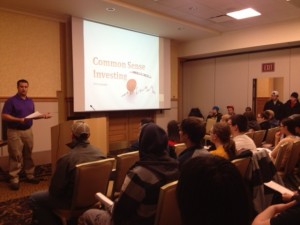
Accounting and Finance students are trained to help you with your taxes!
Tax crunch time is upon us and the Volunteer Income Tax Assistance program is here to help! This program provides FREE income tax preparation assistance at no cost for US students and members of the community who could not otherwise afford the services of a CPA tax professional.
The Volunteer Income Tax Program has been offered on the Michigan Tech’s campus for over 20 years. Tax forms are prepared by accounting and finance students who have complete a semester tax course and a special training seminar. Students volunteer their time and talent for this community service program. Last year over 50 students and community members benefited from this service.
Attend a Session
No appointment is necessary to receive assistance just go to the Academic Office Building, room G010-D the Tidwell Center Conference Room, during one of the session times listed below.
Wednesday: 12 – 4 pm
Tuesday and Thursday: 10 – 2 pm
Bring your W-2′s, form 1099’s, 1098T’s, etc., to one of our sessions. Also bring a copy of last year’s tax return, if possible.
Volunteer sessions will be offered each week from now until, Thursday April 11, 2013.
For more information contact:
Joel Tuoriniemi, jctuorin@mtu.edu, 487-1877 or
Anne Warrington, acwarrin@mtu.edu, 487-1733

The Upper Peninsula Health Care Network (UPHCN) agreed to match donations received for the student-run Mobile Wellness Systems project, which is converting a 15-passenger van into a mobile health clinic for Ghana. The UPHCN gave their matching donation to the team on Wednesday at an event held in the Rozsa Lobby. Administrators from UPHCN, Aspirus Keweenaw, Baraga County Memorial and Portage Health Systems were in attendance.
Students from Michigan Tech’s Pavlis Institute for Global Technological Leadership, in collaboration with the International Business Ventures (IBV) Enterprise and a School of Technology Senior Design team, have joined forces on the project. In addition to van reconfiguration, students are coordinating with area hospitals to secure donations of working, quality, used medical equipment for incorporation into the van.
The team also accepts monetary donations to purchase other supplies for the project and cover shipping costs associated with transporting the van to Ghana later this spring. Michigan Tech’s Superior Ideas crowd-sourcing website was contacted and helped solicit project funds.
Mobile Wellness Systems seeks to provide diagnostic, preventative and treatment services to Ghanaians who live in villages without easy access to larger medical facilities due to their remote location and who are not serviced by international aid organizations such as Doctors Without Borders. The team’s mission is to equip doctors from larger city hospitals with the tools needed to provide healthcare to these disadvantaged populations living in villages located outside of city centers.
The prototype this year’s students are developing will be used for testing in Ghana this summer by local doctors who will be treating and caring for many people who previously had limited access to adequate healthcare. These doctors will provide invaluable feedback concerning the mobile clinic allowing this sustainable project to expand to more villages in the future.
This story was originally published by Paige Hackney in Tech Today.
Last Thursday evening, Vice President of Trust Investments at Superior National Bank, Chris Gariepy, spoke to a full room of Michigan Tech students as he shared his knowledge on common sense investing. Chris discussed highlights from his career on investing and money management. This event was supported by the Finance Club which promotes interest and knowledge in the field of Finance. The objectives of the Club are to increase interest in finance among Michigan Tech business students by relating the experiences of students, professors and alumni and to provide business students a comprehensive understanding of the finance industry.

Chris also provided valuable insight into what it takes as a new college graduate to start investing. Senior, finance major Walker Derby, said “I really enjoyed hearing from someone local who had pertinent advice for people going into the field as well as for individuals who are looking for a greater grasp on financial knowledge.” Derby also noted that having someone with extensive experience in the financial industry address questions was enlightening, especially for students who are new to the field.
Students in attendance from all School of Business and Economics majors benefited from the event. The information that Chris brought was insightful on real world applications and interactions of finance, management, economics, and accounting concepts.

Leave it to students from Michigan Technological University to up the ante on an already exciting race. Two teams of students are lending their talents to the CopperDog 150 Sled Dog Race in the Keweenaw this weekend.
One team will focus on real-time statistics; the other will help provide near-live video streaming via YouTube.
It’s all part of a team dynamics/problem solving course in the School of Business and Economics, taught by Michele Loughead.
“The goal is for students to learn how to create and operate in highly effective teams,” Loughead, an instructor, says. “I teach the tools, but more importantly, we focus on the relationship between each team member,”
It seems to be working. Ben Christensen, a third-year computer network and system administration major from Howell, is spearheading the number crunchers.
“We’ve set up a system that takes the raw data and automatically does all of the calculations and posts it without user intervention,” he says. “All that a person needs to do is put in the raw check-in times from the radio operators.”
He’s especially excited about a new feature: forecasting arrival times at checkpoints.
“We’ll be keeping live stats on the mushers’ average speed and lead times, and posting them all on the leader board,” he says, showing his team’s handiwork on his laptop.
Using last year’s results, they’ve created an interface that will show all the mushers and their times between checkpoints. Rolling over the display reveals their locations.
“And we’ve only been at it for four weeks,” he says. “We looked at other races, like the UP 200 in Marquette, and other sports. Horse racing has some similarities.”
The difference here, he says, is the staggered start of the teams, complicating matters a bit.
“We also called and emailed some of the mushers to see what they would like us to include.”
Radio operators around the course will report the teams’ progress through the checkpoints to a central recording location in Calumet. There, Christensen and his team will crunch the numbers and post them on a high-speed Internet-based spreadsheet for the world to see.
“We had to answer some questions to proceed: what stats to collect, what formulas and calculations to use, how to present it and how to design for the user experience,” Christensen says.
And that includes a smart-device version, half the size of the original, for phones and other smaller screens.
Is it live? Almost.
Nikoli Wiens is leading the team capturing the race on video. The complications are many; but the payoff will be great, the accounting student says.
“We will have access to the dedicated high-speed Internet connection, so that will be huge,” the accounting major from Duluth says. “We’ll be doing video around the starting point, but we want to get out to the checkpoints, too.”
Therein lies the bigger problem: how to get the high-definition video shot out in the woods and brought back to Calumet for uploading in an efficient manner.
“We plan on editing while we’re getting driven back,” he says. “We also need to figure out what to put in, what will be relevant to people. We have to be as prepared as possible beforehand because we know it will be crazy that weekend.”
Teamwork will help, he says. They’ve known each other for a while and work well together.
Good thing.
“There’s so much stuff that needs to be done, he says, “and this is real-world experience, especially under these time constraints.”
Their ultimate goal, driven by Todd Brassard, executive race director, is to “recreate the atmosphere of the event,” Wiens says.
“We want to talk to spectators, too, as well as the mushers,” he says. “We know getting all this online will be a challenge, but it will also be a lot of fun.
And he’s looking down the trail.
“I won’t be able to see the race as much this year, but in the future, after we have a system down and students build it better, smarter and faster when I’m not here, I can come back some day and enjoy the race.”
Brassard is more than happy for the help.
“It makes a lot of sense for us to leverage the brains and work ethics of Michigan Tech students to develop and grow the event,” he says. “With the help of the two teams from the Business School, we are bringing the information we output to the world to a whole new level, with real-time standings and human interest video updates during the event.”
“With only four weeks from concept to execution, if we succeed, it’s going to be amazing,” he adds.
This story was originally published by Dennis Walkainen for Michigan Tech News.
